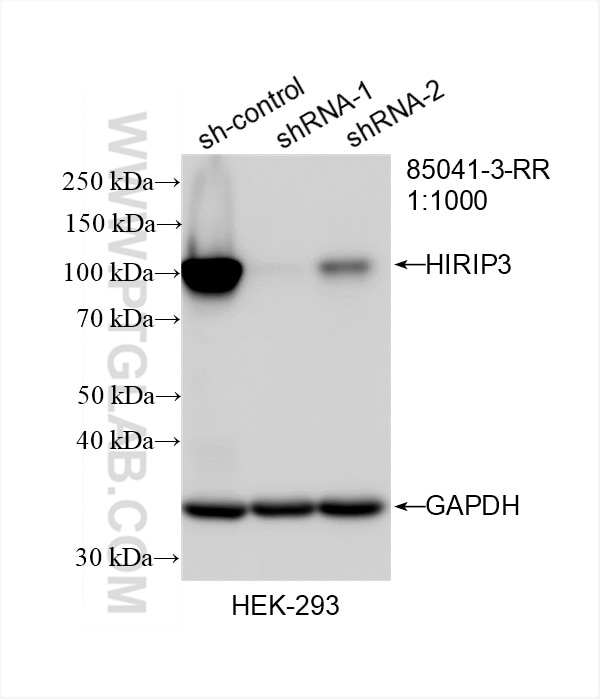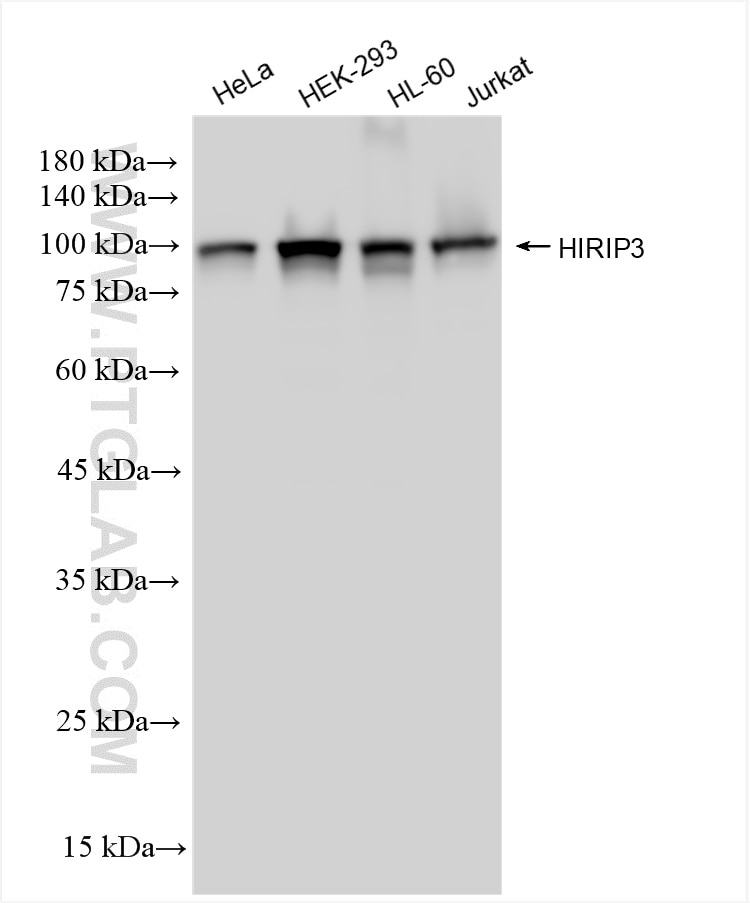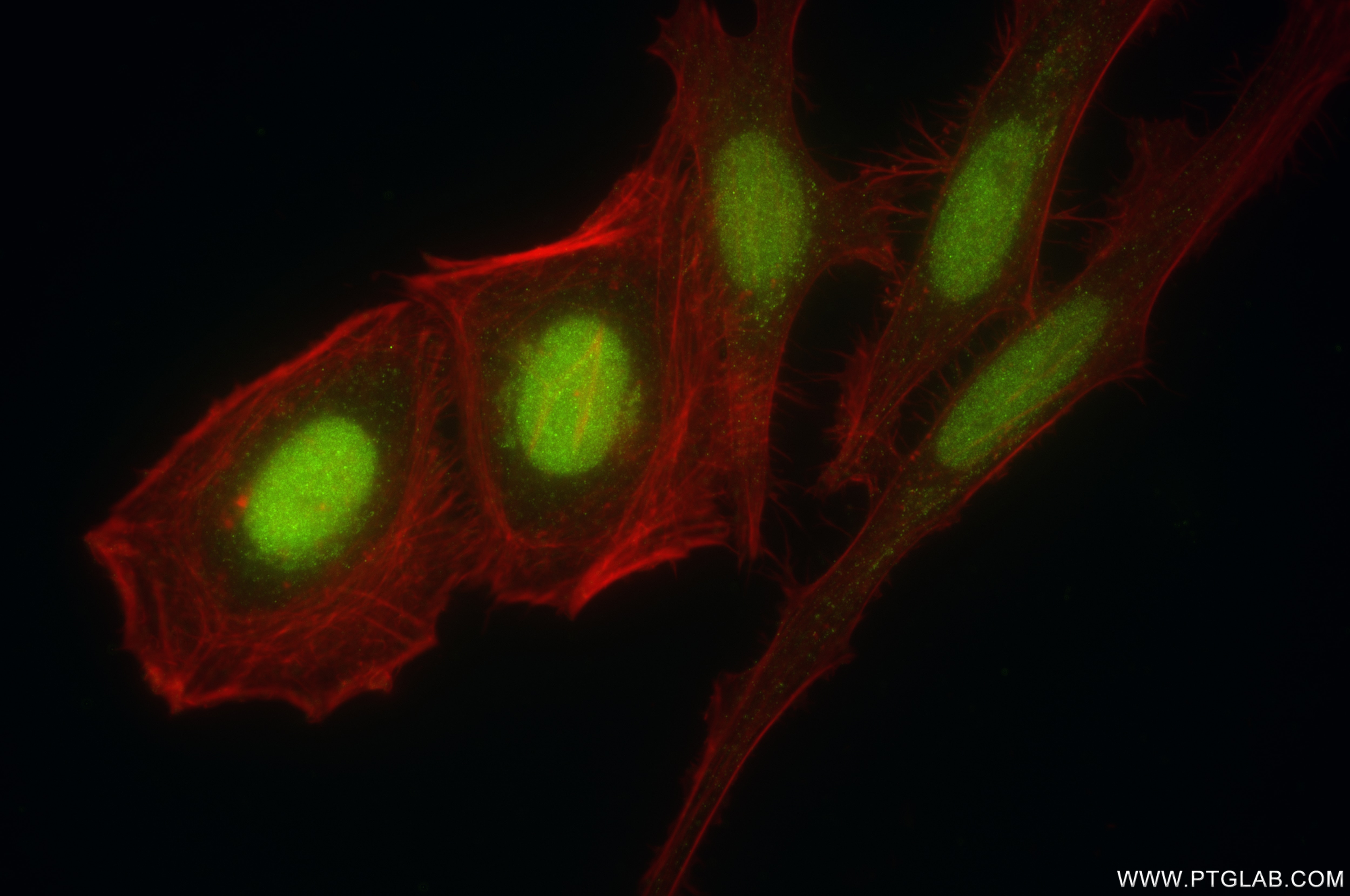Tested Applications
| Positive WB detected in | HeLa cells, HEK-293 cells, HL-60 cells, Jurkat cells |
| Positive IF/ICC detected in | HeLa cells |
Recommended dilution
| Application | Dilution |
|---|---|
| Western Blot (WB) | WB : 1:500-1:2000 |
| Immunofluorescence (IF)/ICC | IF/ICC : 1:250-1:1000 |
| It is recommended that this reagent should be titrated in each testing system to obtain optimal results. | |
| Sample-dependent, Check data in validation data gallery. | |
Product Information
85041-3-RR targets HIRIP3 in WB, IF/ICC, ELISA applications and shows reactivity with human samples.
| Tested Reactivity | human |
| Host / Isotype | Rabbit / IgG |
| Class | Recombinant |
| Type | Antibody |
| Immunogen |
CatNo: Ag6978 Product name: Recombinant human HIRIP3 protein Source: e coli.-derived, PGEX-4T Tag: GST Domain: 207-556 aa of BC000588 Sequence: TAKKVEGNKGTKSLKESEQESEEEILAQKKEQREEEVEEEEKEEDEEKGDWKPRTRSNGRRKSAREERSCKQKSQAKRLLGDSDSEEEQKEAASSGDDSGRDREPPVQRKSEDRTQLKGGKRLSGSSEDEEDSGKGEPTAKGSRKMARLGSTSGEESDLEREVSDSEAGGGPQGERKNRSSKKSSRKGRTRSSSSSSDGSPEAKGGKAGSGRRGEDHPAVMRLKRYIRACGAHRNYKKLLGSCCSHKERLSILRAELEALGMKGTPSLGKCRALKEQREEAAEVASLDVANIISGSGRPRRRTAWNPLGEAAPPGELYRRTLDSDEERPRPAPPDWSHMRGIISSDGESN Predict reactive species |
| Full Name | HIRA interacting protein 3 |
| Calculated Molecular Weight | 62 kDa |
| Observed Molecular Weight | 90 kDa |
| GenBank Accession Number | BC000588 |
| Gene Symbol | HIRIP3 |
| Gene ID (NCBI) | 8479 |
| Conjugate | Unconjugated |
| Form | Liquid |
| Purification Method | Protein A purification |
| UNIPROT ID | Q9BW71 |
| Storage Buffer | PBS with 0.02% sodium azide and 50% glycerol, pH 7.3. |
| Storage Conditions | Store at -20°C. Stable for one year after shipment. Aliquoting is unnecessary for -20oC storage. 20ul sizes contain 0.1% BSA. |
Background Information
The HIRIP3 protein had been identified from its interaction with the HIRA histone chaperone. It may play a role in chromatin function and histone metabolism via its interaction with HIRA and histones.
Protocols
| Product Specific Protocols | |
|---|---|
| IF protocol for HIRIP3 antibody 85041-3-RR | Download protocol |
| WB protocol for HIRIP3 antibody 85041-3-RR | Download protocol |
| Standard Protocols | |
|---|---|
| Click here to view our Standard Protocols |








